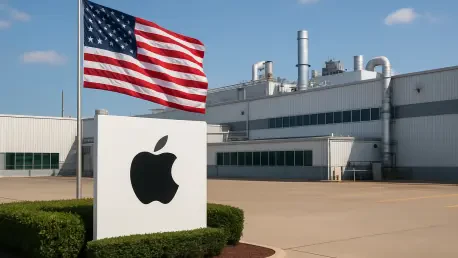In a groundbreaking move that could redefine the landscape of American industry, Apple has announced a staggering $600 billion investment over the next four years to revolutionize domestic manufacturing. This ambitious program aims to bring advanced production and critical supply chain components back to U.S. soil, marking a significant shift in how tech giants approach global operations. With an emphasis on creating jobs, fostering innovation, and strengthening national economic interests, Apple’s initiative is poised to address long-standing vulnerabilities in supply chains while setting a new standard for corporate responsibility in the tech sector. The scale of this commitment, building on previous pledges with an additional $100 billion, underscores a strategic pivot toward localization amid geopolitical pressures and trade uncertainties. As the details of this plan unfold, it becomes clear that the implications extend far beyond a single company, potentially inspiring a broader movement among industry leaders to prioritize American production.
Bolstering Domestic Production and Partnerships
A cornerstone of Apple’s transformative program is the focus on relocating key manufacturing processes to the United States through robust partnerships with leading firms. Companies such as Corning, Samsung, Texas Instruments, and Broadcom are integral to this effort, collaborating to produce essential components for Apple’s iconic products, from smartphone glass to advanced silicon chips. Notably, Corning is set to establish a cutting-edge facility in Kentucky, which will become the world’s largest smartphone glass production line, catering to iPhone and Apple Watch models. Additionally, plans for a comprehensive silicon supply chain aim to deliver an impressive output of 19 billion chips annually through facilities like TSMC’s Arizona plant and Samsung’s Austin, Texas, operation. Beyond chips, new projects include a server factory in Houston slated for mass production by next year and a data center in North Carolina, all of which signal a deep commitment to expanding Apple’s manufacturing footprint across diverse American regions.
Economic Impact and Strategic Alignment
The economic ripple effects of Apple’s $600 billion initiative are already evident, with a pledge to create 20,000 new jobs across various high-tech fields like silicon engineering and artificial intelligence. This workforce expansion reflects a dedication to nurturing innovation while directly contributing to local economies through roles that span research, development, and software expertise. Strategically, the program aligns with national priorities, likely influenced by the need to navigate potential trade tensions and tariffs. The symbolic gestures during the announcement, including CEO Tim Cook’s White House appearance, highlight a deliberate effort to position Apple as a partner in America’s industrial resurgence. This initiative also mirrors a wider industry trend of reevaluating supply chains for resilience, reducing dependence on overseas production. Looking back, Apple’s calculated steps have cemented a legacy of leadership in domestic manufacturing, setting a precedent that encourages other tech giants to rethink their global strategies and invest in American innovation.









